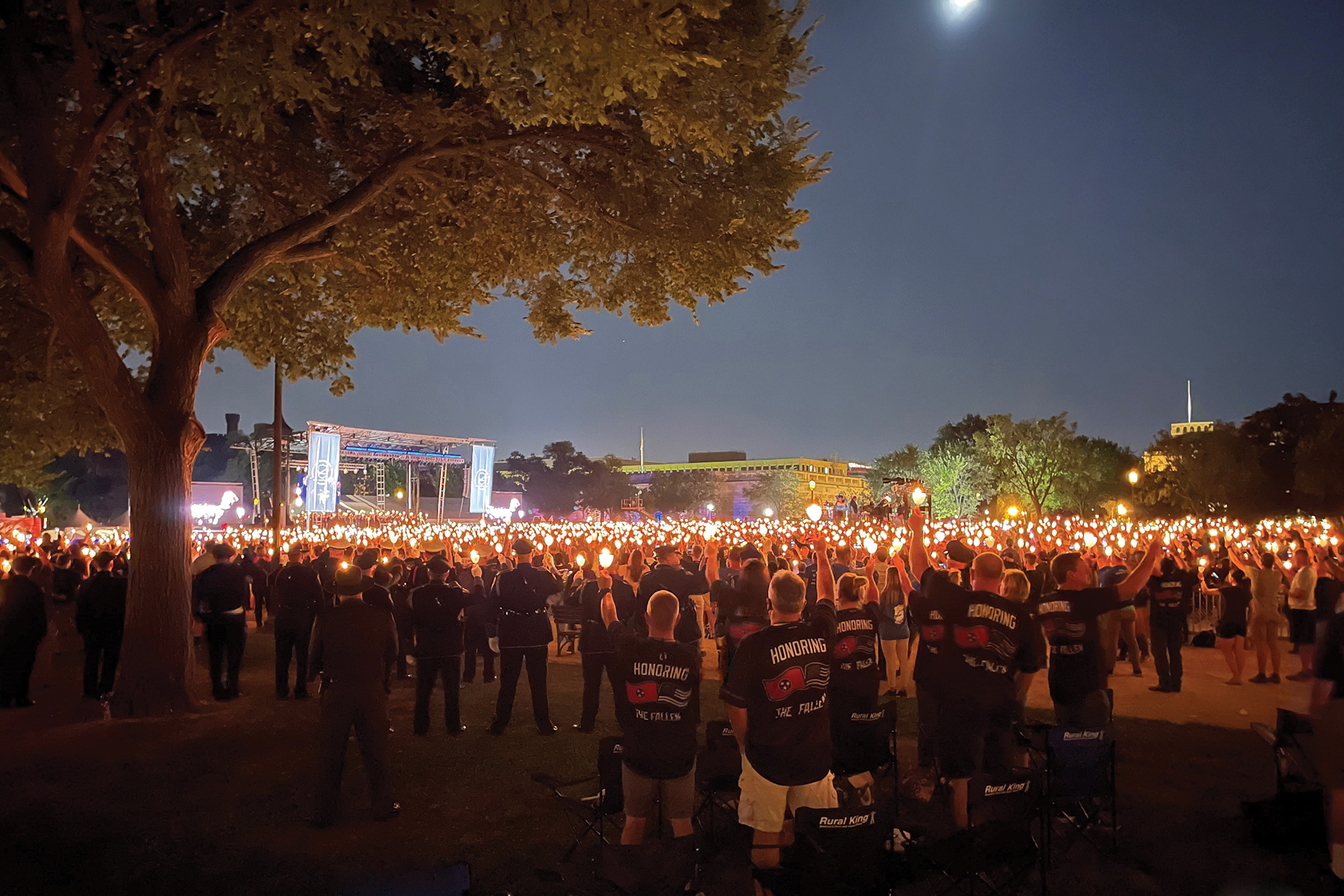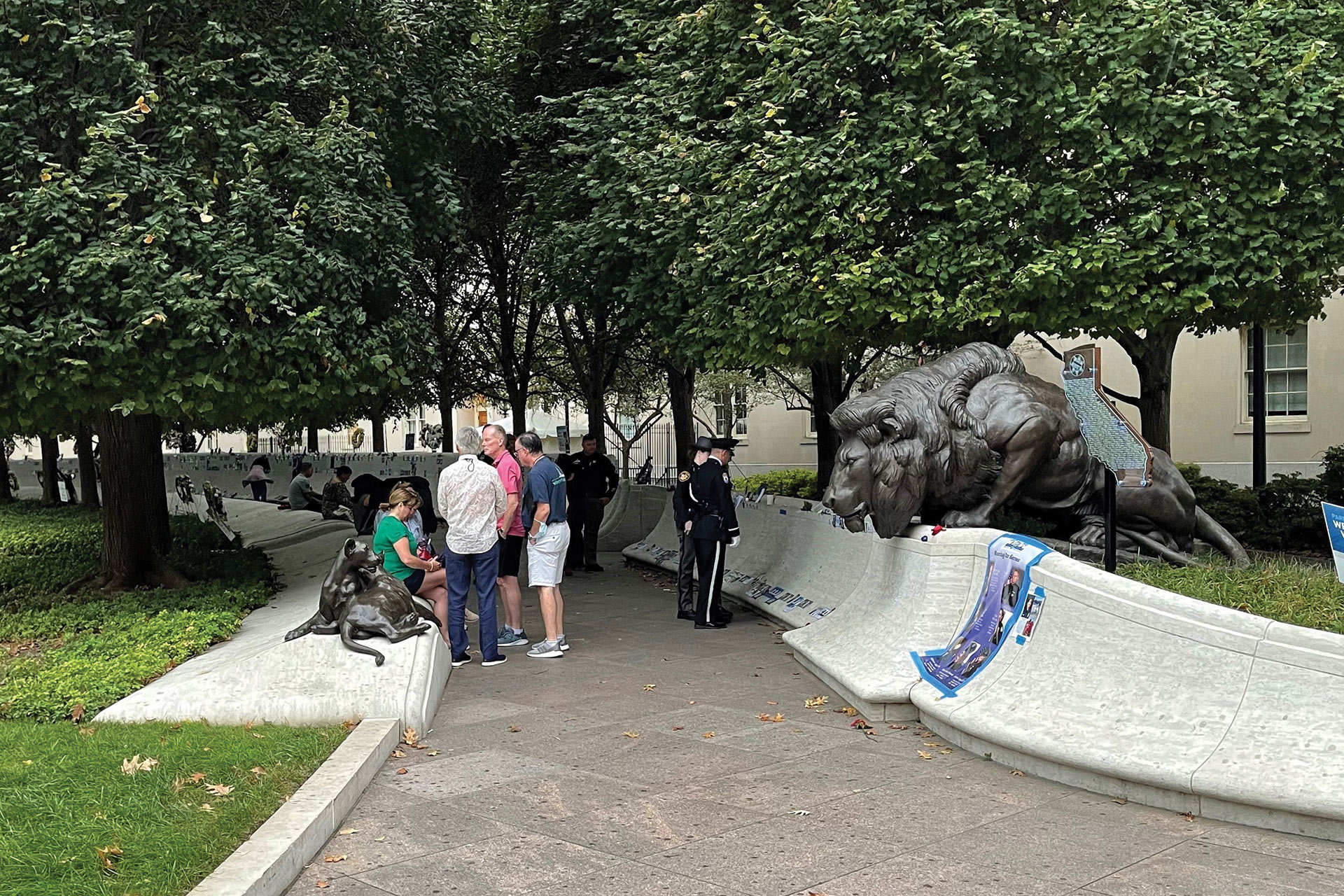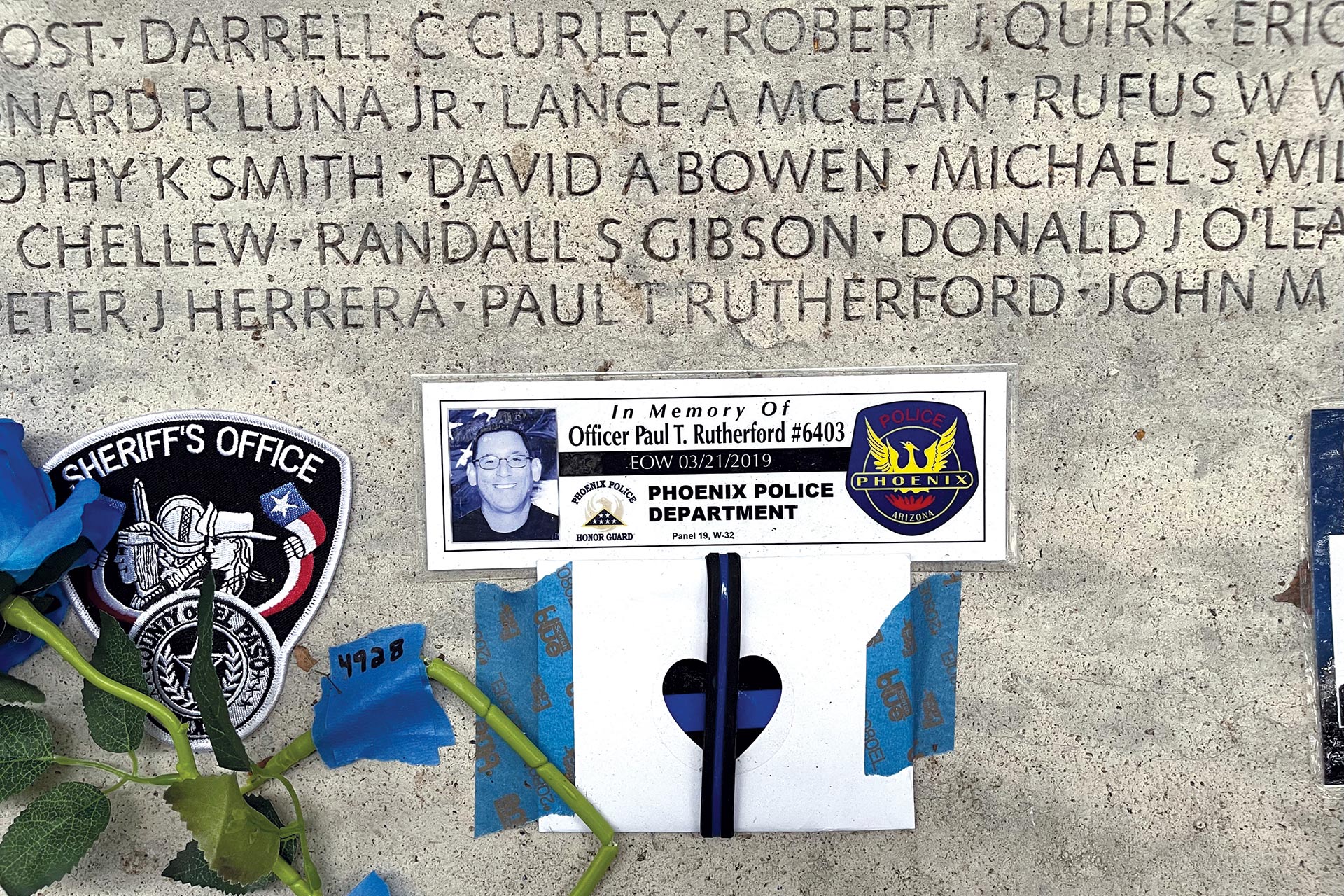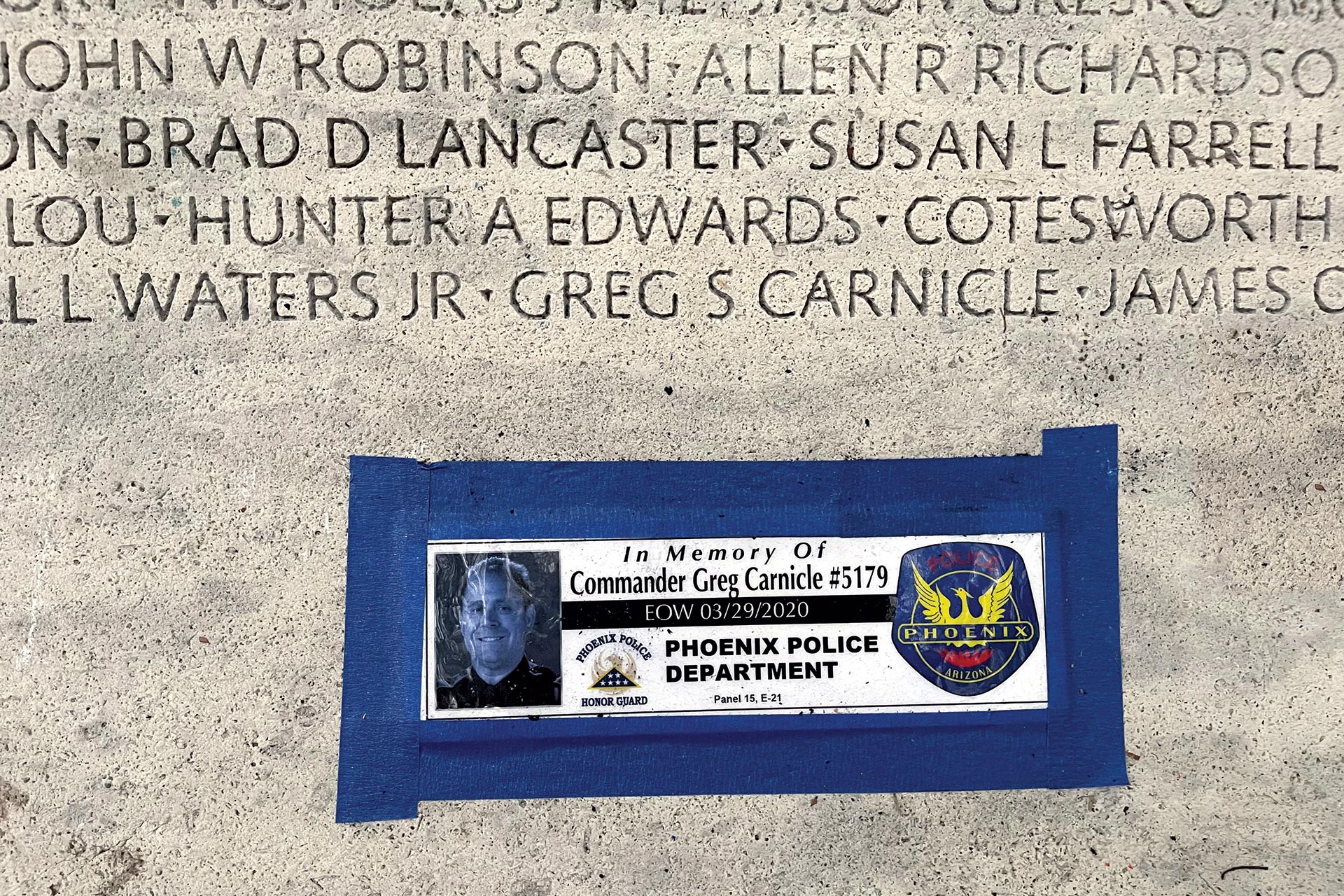Archive of articles posted to the website.
 From October 13 to 17, PLEA joined law enforcement agencies around the country during National Police Weekend to recognize and honor our fallen heroes who died in the line of duty. This year, 701 new names — including Phoenix Police Commander Greg Carnicle (EOW: March 29, 2020) and Officer Paul Rutherford (EOW: March 21, 2019) — were formally dedicated on October 15 during the 33rd Annual Candlelight Vigil.
From October 13 to 17, PLEA joined law enforcement agencies around the country during National Police Weekend to recognize and honor our fallen heroes who died in the line of duty. This year, 701 new names — including Phoenix Police Commander Greg Carnicle (EOW: March 29, 2020) and Officer Paul Rutherford (EOW: March 21, 2019) — were formally dedicated on October 15 during the 33rd Annual Candlelight Vigil.
In 2020, 307 officers — 135 who were killed in 2019, plus 172 who died in previous years — were added to the National Law Enforcement Officers Memorial. And in 2021, 394 officers — 295 who were killed in 2020 (182 of those fatalities are related to COVID-19), plus 99 who died in previous years — were added to the memorial.
The vigil, which was held on the National Mall and produced by the National Law Enforcement Officers Memorial Fund, was a time for officers, family members, survivors and supporters to mourn for their fallen heroes and pay tribute to the sacrifices they made. For as far as the eye could see, thousands of candles burned brightly as each attendee reflected on stories and memories of their fallen hero.
After two postponed National Police Week gatherings in May 2020 and 2021 due to pandemic restrictions, the opportunity to travel to our nation’s capital and finally gather again was a special moment cherished by all.
There were several other events throughout the weekend that also honored our fallen. On October 13, law enforcement leaders and members of the Police Unity Tour completed their 300-mile journey to honor those who fell in the line of duty. The annual “ride for those that died” event paid tribute to fallen officers, as men and women completed their trip to the National Law Enforcement Officers Memorial. The ride started in New Jersey before continuing to Wilmington, Delaware, and Annapolis, Maryland. The final leg of the trip was a 60-mile journey to the Memorial in Washington, D.C.
On October 16, the National Fraternal Order of Police and the National Fraternal Order of Police Auxiliary hosted the annual National Peace Officers’ Memorial Service on the west front lawn of the U.S. Capitol. The service featured emotional tributes from various speakers and performers, and many family members of the fallen placed a flower in the memorial wreath as their loved ones’ names were read. Following the service, a wreath-laying ceremony took place at the National Law Enforcement Officers Memorial.
We will never forget!

Phoenix Police Commander Greg Carnicle (EOW: March 29, 2020) and Officer Paul Rutherford (EOW: March 21, 2019) were two of the 701 fallen heroes who had their names etched on the walls of the National Law Enforcement Officers Memorial and read by high-ranking government officials and leaders from local, state and federal law enforcement agencies during the 33rd Annual Candlelight Vigil. The vigil, which was part of National Police Weekend, was a time to honor the life and sacrifices of two heroes who shared a commitment to community and family.

On March 21, 2019, PLEA was devastated to learn about the passing of Officer Rutherford, who succumbed to injuries he received when he was struck by a vehicle near the intersection of 75th Avenue and Indian School Road. Always referring to himself as “the everyday, average, run-of-the-mill street cop,” Rutherford proved to be so much more during his 23 years of service with the Phoenix Police Department. Traveling to Washington, D.C., for the National Police Weekend events was Rutherford’s family, who were joined by Rutherford’s squad mates and officers from the Employee Assistant Unit.

A little over a year after Rutherford’s tragic passing, on March 29, Phoenix P.D. lost another hero — Commander Greg Carnicle, who was shot and killed while he and two other officers were responding to a domestic disturbance call. Carnicle served with the Department for 31 years and was scheduled to retire in just a few months. After the incident, Carnicle’s family provided the following statement to the Department: “There are literally no words that can properly convey the incredible man our husband and father was. He was a selfless man who was always there for a neighbor, a friend, his brothers in blue, but mostly his family. He dedicated his life to serve, protect, provide for, and love us. He was truly our hero and always will be. He touched many lives and many hearts have now been broken. We are beyond thankful for our community. We appreciate the outpouring of kind words and we hear your prayers. We know he will live on through the character and love he built in our family. We are strong because of him and we will do our best to live to the fullest to honor him.”
One of the most touching moments from the candlelight vigil came when Carnicle’s young grandson was seen kissing his grandfather’s picture on the memorial wall, a moment that serves as a reminder of the great loss each family faces with the loss of their loved one. We will always remember the bravery and sacrifices Commander Carnicle and Officer Rutherford made. They will always be in our thoughts and prayers.

On August 5, 2021, the Civil Rights Division of the U.S. Department of Justice (DOJ) announced a pattern-or-practice investigation into the Phoenix Police Department. As the news spread around the Valley, questions started coming into the PLEA Office about the consequences of such an investigation and what, if anything, could be done to intervene.
Many of the questions we received from the membership surrounded the topic of how the DOJ came to focus on the Phoenix Police Department. In seeking an answer to this question, the PLEA Executive Board directly asked this of three DOJ attorneys during a meeting at PLEA. In short, we were told that the DOJ has been observing Phoenix P.D. for a while. Well, our feeling is that this is a political move by a portion of elected City leadership that has a distaste for our department and a mission to abolish police services by any means possible.
So, how does this all work? We have luckily had no shortage of advice from our brothers and sisters on the West Coast and in the Southwest who are already dealing with the DOJ in their respective departments. Simply put, an investigation either warrants action or not. If a pattern or practice of unconstitutional policing is found, the DOJ will attempt to negotiate an agreement with the City to take corrective action, which becomes a federal court order overseen by an independent monitor. If the DOJ cannot negotiate a reform agreement, it will then initiate a lawsuit to secure the recommended reforms.
Every person I have had the opportunity to learn from tells me that nothing good can come from DOJ involvement in a police department. I have also been told that you can’t stop the feds. Issues that are immediately mentioned by these experienced police association leaders in dealing with DOJ-controlled departments are (big surprise) a lack of officer morale, a decrease in work output and an increase in reported crime in their communities. It really isn’t hard to understand, I guess. We are already dealing with recruitment and retention problems, low morale and the ever-popular looming mandates of COVID testing, vaccination, mask-wearing and a majority of elected City leadership that does not publicly support us. Couple those existing issues with the possibility of a DOJ-controlled department, and the self-starters begin to question why they even start at all in the law enforcement profession anymore.
I have also been told by more than one police association president that the DOJ has most likely already established an arguable pattern of police conduct and that the announcement of an investigation is just the precursor to an already planned consent decree with the City of Phoenix.
If you happen to take an internet trip to some of the cities currently enduring federal intervention, you will notice there is no shortage of opinions from the media, law enforcement, government officials and citizens on the effectiveness of the DOJ. Search social media for cities such as Portland, Seattle or Minneapolis. These same cities have a dangerously low level of law enforcement personnel and a climbing crime rate. One of the cities mentioned has had to have a judge order it to hire more officers. Can the DOJ solve these issues or not? What is the metric for success?
Couple those existing issues with the possibility of a DOJ-controlled department, and the self-starters begin to question why they even start at all.
Researching surface issues related to DOJ investigations of police departments is not difficult. There are a number of articles that can be found containing subjects involving the results of investigations and arguments for and against federal involvement in municipal police departments, but there is not much in the way of confidence-instilling positivity for police employees and the communities they serve. In any regard, it seems we will soon have firsthand knowledge.
As professional pessimists, we cops normally seek out worst-case scenarios when presented with something new, looking at everything that could be wrong in an attempt to protect what we consider right. With this in mind, I would like to offer some not-too-scary observations of nearby departments that are actually under a federal consent decree and have a court monitor (remember, that is not what is happening to us at the moment). Firstly, these departments are still around — a super-important observation. These departments still have employees and most continue to hire new employees. All are still able to negotiate contracts, and some have even won compensation and benefit increases for their employees. I’m sure not all employees at these departments are happy, but that differs with each individual anyhow. I just thought I would throw that in for good measure.
The Phoenix Police Department is approaching a situation that can bring about apprehension, because of what is unknown and the feeling of a lack of any guarantee of future working conditions. If you do feel apprehensive, remember that it is normal when faced with changing situations and the unknown. Know that PLEA will continue to provide intelligent representation to our membership while seeking the latest and most accurate information to keep you up to date with our evolving department.
PLEA is proud to represent the men and women of the Phoenix Police Department. Stay focused and don’t be divided by those who manipulate our honorable profession.
 There’s no doubt that these are uniquely challenging times for law enforcement officers. The past 18 months have brought the ongoing anxiety of a global pandemic, the upheaval of civil unrest, rising crime, demoralizing calls to defund or even abolish police, and increased tension between law enforcement and the communities they serve. All of this only adds to the already high levels of traumatic stress officers experience in the regular course of their work, which increases the risk of psychological injury, depression and suicide. With National Suicide Awareness and Prevention Month being observed in September, PLEA urges members to be extra mindful of mental health pressures, the warning signs to watch out for, how to support those who are struggling and how to get help if needed.
There’s no doubt that these are uniquely challenging times for law enforcement officers. The past 18 months have brought the ongoing anxiety of a global pandemic, the upheaval of civil unrest, rising crime, demoralizing calls to defund or even abolish police, and increased tension between law enforcement and the communities they serve. All of this only adds to the already high levels of traumatic stress officers experience in the regular course of their work, which increases the risk of psychological injury, depression and suicide. With National Suicide Awareness and Prevention Month being observed in September, PLEA urges members to be extra mindful of mental health pressures, the warning signs to watch out for, how to support those who are struggling and how to get help if needed.
Silence has surrounded this issue for far too long, so it’s difficult to know exactly how many officers we’ve lost to suicide. The nonprofit Blue H.E.L.P. has recorded 919 suicides of police and corrections officers from 2016 through 2020, but it’s likely the true number is far greater. We do know that a record-breaking number of officers died by suicide in 2019, more than all other line-of-duty deaths that year combined. This doesn’t necessarily mean suicides are increasing — it may be a sign that the stigma is being broken and more are being reported. To better understand and prevent suicides among current and past law enforcement officers, corrections officers and 9-1-1 operators nationwide, a new law was signed by the president in June 2020. In the same way the federal government tracks the number of officers killed and assaulted in the line of duty, the Law Enforcement Suicide Data Collection Act (LESDCA) directs the FBI to institute a system of data collection to monitor suicides and attempted suicides — a major step forward in recognizing the emotional toll the job can take on officers and their families.
Even if the current statistics paint an incomplete picture, the numbers are far too high, reminding us that officers need to be just as alert to their mental health on duty as they are to physical dangers such as shootings, car accidents and heart attacks. Whether it’s PTSD tied to a specific event or the accumulation of day-to-day stress over time, emotional injuries can be life-threatening. There are many ways this traumatic stress can manifest. Here are some of the signs that indicate someone may be at risk for suicide, according to the National Suicide Prevention Lifeline:
- Talking about wanting to die or to kill themselves
- Looking for a way to kill themselves, like searching online or buying a gun
- Talking about feeling hopeless or having no reason to live
- Talking about feeling trapped or in unbearable pain
- Talking about being a burden to others
- Increasing the use of alcohol or drugs
- Acting anxious or agitated; behaving recklessly
- Sleeping too little or too much
- Withdrawing or isolating themselves
- Showing rage or talking about seeking revenge
- Extreme mood swings
If you or someone you know is experiencing symptoms of a mental health crisis, it’s important to address it. The National Alliance on Mental Illness suggests the following approaches to help:
- Talk openly and honestly. Don’t be afraid to ask questions like: “Do you have a plan for how you would kill yourself?”
- Remove means such as guns, knives or stockpiled pills.
- Calmly ask simple and direct questions, like “Can I help you call your psychiatrist?”
- If there are multiple people around, have one person speak at a time.
- Express support and concern.
- Don’t argue, threaten or raise your voice.
- Don’t debate whether suicide is right or wrong.
- If you’re nervous, try not to fidget or pace.
- Be patient.
The most important thing to know about suicide is that it’s preventable. It’s a temporary state of mind, not an inevitability. It’s usually tied to a life event that feels like an insurmountable catastrophe to the person who is suffering it, but that perception is rarely true. In the moment, a suicidal person may simply be desperate for their pain to end and feel like they have no other options. That’s why asking how someone is doing, listening with compassion and without judgment, and encouraging them to seek help are some the most powerful things you can do for a colleague, friend or family member in crisis.
The most important thing to know about suicide is that it’s preventable. It’s a temporary state of mind, not an inevitability.
Unfortunately, sharing feelings has not been a hallmark of traditional law enforcement culture, and many officers must still overcome denial, taboos and fear of professional repercussions if they are open about their emotional struggles. That is slowly changing, as agencies and policymakers increasingly recognize the importance of supporting officers’ mental health. However, the issue is too urgent to simply wait for progress to come from the top down — it’s also important to look out for and support each other. Officers routinely respond to mental health crises in their communities and intervene to prevent citizens from committing suicide, but may not remember to extend that same aid to themselves and their law enforcement brothers and sisters.
If you or someone you know is struggling with suicidal thoughts or other emotional stresses, please don’t stay silent. Here are some resources you can reach out to for help.
- Phoenix P.D. Employee Assistance Unit (EAU), which provides crisis intervention, peer support and resources for psychological services: 24/7 hotline at (602) 262-1892
- CopLine, a 100% confidential helpline for officers and their families, answered by retired police officers: 24/7 hotline at (800) 267-5463
- Crisis Text Line, which connects you with a live, trained crisis counselor: Text BLUE to 741741
- National Suicide Prevention Lifeline, free, confidential support for people in distress: 24/7 hotline at (800) 273-8255
In today’s atmosphere surrounding law enforcement, it can sometimes be too easy to feel like the world is hostile or uncaring. PLEA wants all of our members and our colleagues throughout the profession to know that they matter and are not alone. It’s OK not to be OK, but suicide is never the answer. Help is available, and there is always hope.
The terrorist attacks of September 11, 2001, rocked our country to its core, forever transformed our national security landscape and caused more law enforcement line-of-duty deaths than any other single event in American history — close to 400 over the course of that terrible day and the ensuing two decades.
After the first plane struck the World Trade Center, first responders rushed to the burning buildings to evacuate the victims, saving an estimated 25,000-plus people through their heroic efforts. Tragically, when the towers collapsed, 71 officers from seven local, state and federal agencies were killed, along with 343 New York firefighters and more than 2,800 civilians. A short time later, Richard Guadagno, an officer with the U.S. Fish and Wildlife Service, died aboard United Flight 93 when the plane crashed into a field in Shanksville, Pennsylvania, as the passengers bravely fought to regain control from the hijackers.
Furthermore, as rescue, recovery, investigation and cleanup efforts continued at the World Trade Center, Pentagon and Flight 93 sites in the following weeks, the contamination in the air posed another deadly threat. According to the CDC, tens of thousands of 9/11 first responders, recovery workers and survivors are now sick with cancer and other illnesses related to the hazards and toxins they were exposed to, and nearly 2,000 have died as a result, including hundreds of law enforcement officers. Many of those affected tirelessly advocated for health care and financial compensation until finally, in 2019, the signing of the Victim Compensation Fund Permanent Reauthorization Act ensured that the federal government would appropriate money to pay all eligible claims until 2090 — a sorely needed and deserved resource for the victims, as well as a reminder that the far-reaching repercussions of that single catastrophic day will continue to be felt for decades to come.
As we reflect on the 20th anniversary of 9/11 this month, please take time to remember the heroic actions of the fallen officers and our fellow first responders who made the ultimate sacrifice that day and afterward, those who are still suffering the effects of this tragedy, and all members of law enforcement who have worked diligently ever since to prevent future attacks. We will never forget.
Since July of 2014, PLEA has been in the litigation trenches with aims of securing many of your pensionable benefits that were unceremoniously and unilaterally stripped away from you with the City Council’s imposition of the 2012–2014 Terms and Conditions of Employment (TCE). As you will recall, the TCE eliminated certain provisions from your MOU that previously allowed eligible officers to receive additional compensation instead of accruing additional sick or vacation leave or receiving their annual uniform allowance. The additional compensation was structured in a way that allowed it to be included in the officers’ pension calculations. Following imposition of the TCE in July 2014, PLEA filed a lawsuit on behalf of all rank and file officers alleging claims for breach of contract and violations of the pension and contracts clauses of the Arizona Constitution.
Over the last seven years, our office has fought several legal battles related to this lawsuit — in the superior court, court of appeals, and the supreme court. At each stage, we prevailed. In June, however, the superior court found that “[a]ny claim for relief is barred unless a plaintiff was approved and participating in the wage enhancement program on or before July 1, 2014.” This decision significantly narrowed the issues and the potential class size going forward. Officers who were not yet participating in the conversion programs as of July 1, 2014 do not have a claim going forward.
Accordingly, we filed a motion to certify our case as a class action lawsuit. Class certification motions, responses, supplemental briefing and oral arguments spanned from January 2019 to October 2019. On October 22, 2019, the superior court granted our motion for class certification. Unfortunately, we were not able to proceed to the merits of the case because the City filed an appeal of the class certification ruling in November 2019.
After appellate briefing and oral arguments held in November 2020, the Court of Appeals affirmed the superior court’s certification of our class action litigation. In a surprising departure from their demonstrated litigation playbook, the City did not appeal the Court of Appeals decision to the Arizona Supreme Court. The lawsuit is now back before the superior court and a notice will be sent to all officers that were approved and participating in the wage enhancement program on or before July 1, 2014.
If you are one of these officers, it is imperative that you pay special attention to any notices sent from our law firm and that you are in contact with our firm to be actively engaged in the fight for the MOU pensionable benefits that you’ve earned.
If you have any questions about this article or general legal issues in law enforcement practices, please visit napierlawfirm.com or contact me at ewilson@napierlawfirm.com
